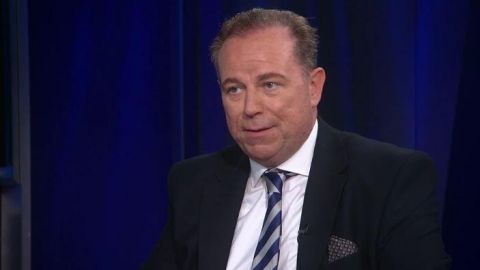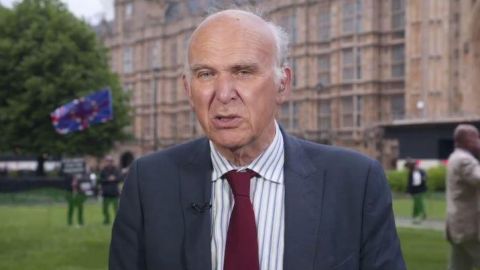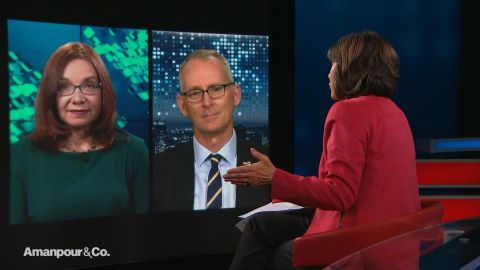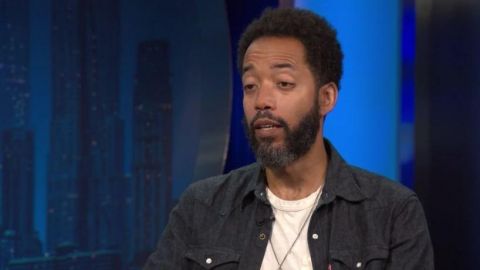Read Transcript EXPAND
CHRISTIANE AMANPOUR: Wyatt Cenac is a comedian and a writer who made his name as a correspondent on “The Daily Show with Jon Stewart.” Now, he hosts “HBO’s” Problem Areas. It’s a series that explores the nation’s most pressing issues through a satirical lens. This season, the show is tackling inequality in education and Cenac has traveled across the country to hear from everyday people about how the current system impacts them. And he sat down with our Michel Martin to discuss what he learned.
(BEGIN VIDEO TAPE)
MICHEL MARTIN: I know what your show is called, but what do you call it? How do you think of it? Like — because it’s — I was trying to figure out how to describe it for people who haven’t already seen it.
WYATT CENAC, HOST, HBO PROBLEM AREAS: If I were to describe the show, I would say that what we’re doing is trying to take one topic and really look at it in a much more localized way across a season and take like a big thing that has been part of a national conversation of the first season, it was policing in America. This season, it’s been education. And how do you take something like that and actually give it, week to week, life and traveling around the country, talking to people who are not just impacted by these things but also trying to create models or pathways that could be replicable and bring about some kind of change?
MARTIN: Why education for the second season?
CENAC: A free public education has been a hallmark of this country. And what’s interesting about education is that it is — while it is a, you know, while we think of it as a right, it isn’t a guaranteed thing. There is no federal mandate that we must educate children in this country. And if there’s anything, there are state requirements that say, like, we will adequately educate a child. And what you see when you go into a city and even thinking about a city like New York where you are seeing these lotteries for these high performing high schools in the same city where you see schools that are underfunded and under-resourced and crumbling. And for me, there’s this question of, how do these two things both qualify as the definition of adequate? And why does education become some sort of Scarlet letter lottery system that it becomes a lifeline for some people and it’s ostensibly teenage daycare for others?
(BEGIN VIDEO CLIP)
UNIDENTIFIED MALE: I was failing badly. I would skip school to smoke weed, hang out. The other thing was I got shot in both my legs in a drive- by so I was out of school but the teachers supported me through.
UNIDENTIFIED MALE: He was one of our IB students and he was one of the ones that really was talking about, man, is this going to be for us, Mr. Chappell? Are you sure we going to be able to do this?
UNIDENTIFIED MALE: Dajan was selected among nine other students to go to the IB World Student Conference and has students from all over the world.
UNIDENTIFIED MALE: We went to Montreal, Canada and it was amazing. It was very life changing and stuff like that to be able to have experience and, like, see what other people’s like. I was actually scared to tell everybody my background story because I was like, I’m just a wannabe gang banger over here. But these really positive people, it changed my life. They put a lot of sweat and tears into many and other kids.
(END VIDEO CLIP)
MARTIN: What was the story you wanted to tell with that segment?
CENAC: So to me, the story I wanted to tell was, looking at a school like that, that these parents worked incredibly hard to save this school, now you see the students working incredibly hard to advocate for themselves and they actually advocated for free bus passes for all students so that they could get to school. And they did it not just for their school but for all the schools and you see them doing this and fighting for these things in a city like Seattle that has so much wealth and a city that you see companies like Amazon and Microsoft and they have developed this city where you’re seeing skyscrapers go up but you have a housing crisis. And one of the teachers who is a Seattle teacher that we interviewed, talked about how he, at his high school, there were over a hundred kids that were homeless. And it’s like, you have a city that has a housing crisis and what you see is companies like Amazon actually bristling against taxes, raising taxes on them as a company to help create affordable housing that could be used by the families of these homeless kids so that they would actually have a home and not have to bounce around or do whatever and miss out on educational opportunities. And so if you’re not recognizing that, like, right, we need to make sure that there’s an equity that exists for all of the kids in this city, then we are not as progressive as we might hold ourselves up to be and we are not doing a true service to our city.
(BEGIN VIDEO CLIP)
UNIDENTIFIED FEMALE: This is my she shed. I love it out here. I can think and I can create. And you know, if I’m mad, I can yell and scream and nobody’s going to hear me.
CENAC: Right. You prefer the she shed to the herage or the basewoment?
UNIDENTIFIED FEMALE: Oh, yes. Out of high school, I got married and divorced and I became a single mom. And I went to Maytag. I worked there for like 20 years. Most of our parents worked at Maytag and then it was just like if you don’t get a degree and go somewhere else to do something different, you just go to Maytag. You’re there for life. And then if you ask anybody in Newton, anybody, at that time that Maytag was going to shut down one day, they — we all said, oh, you’re crazy, that’s never, ever going to happen.
(END VIDEO CLIP)
CENAC: In that clip, we were interested in spending a season on education. One thing that kind of kept coming up over and over again was automation and just how there are people who are currently in the eye of the storm of automation as their jobs that they depended on and that you were told were, you know, a good middle-class job that you could have — you could work for 30, 40 years and cruise into a pension and buy a house. For a lot of those workers, they’re not being displaced. And so I think in thinking about education, part of the conversation to me was, well, for those workers, what — like, how do they then get educated for the next job and is the next job something that they can trust to have for the next 20 years? Or is it something that, in another three years, they’re going to be right back where they were?
MARTIN: I wonder if your goal in finding this guest is in part to say, you know what? I’m a black dude, but I can see you and I care about what — I care about you too.
CENAC: I think on some level, yes. And then I think on some level, it’s that I’m curious. I’m curious to know your story. And just to hear someone like her speak about, right, these were jobs that you felt like you could trust that these jobs were going to be there forever. And what — you know, to me, it feels like, oh, that’s interesting to hear you say that because, one, your story’s not that unique from, you know, the many black and brown teachers who had jobs — who took teaching jobs in the ’60s and ’70s, thinking they would have these jobs for a long period of time. And then sort of in the wake of desegregation, often times, they were the first people to lose jobs. And they — and so it’s like, oh yes, your story’s not that different from so many other working people who took a job thinking, I want to buy a house, I want to be able to take care of my family and I want to trust that I have this job. And right, as society, as any of these changes happen economically like we’ve put so much of our focus into how do we achieve economically that we’ve not put it into how do we achieve humanely.
MARTIN: People know you as a comedian but it is a journalistic enterprise, right? I mean it’s about — well, comedy’s also about truth too in its own way, isn’t it?
CENAC: Agreed. And I think that’s always been part of the DNA of comedy, that, you know, whether you’re talking about comedians like Dick Gregory or Richard Pryor or Lenny Bruce or George Carlin, who got on stage and talked about the news of the day or social issues or talked about somebody like Joan Rivers who was one of the first female comedians to enter into a world and just that as a political act of, like, you’re entertaining an audience of primarily men and trying to get them to see and pay attention to issues that impact you as a woman and going then even further back and thinking about, like, political cartoons. And so there has always been this element of a truth that exists and using comedy to kind of get people to engage with those truths in different ways. It’s just the next evolution of, right, how can — what new medium can we use to engage people with topics in a funny way?
(BEGIN VIDEO CLIP)
UNIDENTIFIED MALE: I’ve milked cows for eight years, day in through day out. It is exhausting.
UNIDENTIFIED FEMALE: When Justin and I first met, sometimes that was the way to spend more time with him was to assist in the milking parlor.
CENAC: That was a date? Hey, you know —
UNIDENTIFIED FEMALE: I didn’t consider it a date.
CENAC: I mean it’s a cheap date.
UNIDENTIFIED FEMALE: Yes.
UNIDENTIFIED MALE: Being a small farm, that’s very challenging these days, just trying to survive, keep the generations going. Because these big farms, the day-to-day [13:50:00] cost are a lot cheaper for them than we are. So that’s very challenging. And it’s like if we’re going to raise a family and milk cows, we have to figure out a different way.
(END VIDEO CLIP)
MARTIN: I want you to talk about your first season. Your first season, you focused on — you were calling it restorative justice. I want to call it policing, broadly defined if that’s —
CENAC: The whole season was policing.
MARTIN: Policing.
CENAC: But we had one episode that just focused on restorative justice.
MARTIN: Right. Well, it focused on kind of the whole ecosystem of policing. And I don’t want to glide past the fact that you are yourself a person whose life was marked by a crime. Your dad was killed in a, I guess it was robbery, murder —
CENAC: Yes. He was a New York City cab driver.
MARTIN: He was a cab driver and he was murdered —
CENAC: Yes, a teenager.
MARTIN: — by a teenager, right? And that has to have had a profound effect on your life.
CENAC: It has. It has. I mean I think it’s what was interesting to me in my life was later in life I got to actually see my father’s police file and I got to see the actual person who, like, I saw the name, I saw the face, I saw — OK, this guy was a teenager and now he is an adult who has been in and out of the criminal justice system for — from his teenage years to his adult years. And that — murdering my father was at least based on his record the most violent, terrible thing he did and he did it as a teenager. And that is not to absolve him of it but what’s interesting is for me, everything else in his life that he was arrested for seemed like petty theft or it was, like, intent to sell. And for me, looking at that, what I find myself thinking is, like, here’s what’s so messed up about the criminal justice system. The criminal justice system has said, OK, you have served your time and we say you’ve served your time and you’ve done your debt to society and to me and my family. And now you are free to go about your life in the world. But you’re not actually free because you can’t really get a job because most people aren’t going to hire you. You’re going to have trouble getting an apartment or trying to buy a home. You’re probably not going to be able to leave the city or state for opportunities because that’s going to be a challenge. You maybe didn’t get an education while you were in prison to now as an adult be able to even enter the job market. So what are you going to do? You’re more than likely going to find yourself doing things like trying to sell drugs or — like it is sending you back into a sort of criminal world. And to me, I think there was a part of it that’s like, look, this guy did something heinous and the hope would be, if he’s truly paying his debt to society, that the rest of his life would be working towards making the world better than the moment he made it terrible.
MARTIN: I understand your point and I appreciate it. I was actually thinking more about the you in that and how that experience informs the way you look at these things.
CENAC: Sure.
MARTIN: Because I could easily see where this happened to you, your father was taken from you, and you could be mad the rest of your life about it.
CENAC: Yes.
MARTIN: And you were — you could see yourself as the guy who wants to get the bad people off the streets or I want to — you know what I mean? So I was just wondering how those experiences have informed the way you want us to talk about these things.
CENAC: Yes. When I was younger, there was definitely a part of me, like I loved Batman as a kid. And it was, like, I related to Batman because Batman’s parents were murdered and all he wanted was revenge. And I think there is a — at some point, it was like, OK, that’s really not a sustainable thing and that’s not really doing anything. But what it feels like you want to do or at least what I would want to do is I just want to try the understand> And maybe if I understand and maybe if we can sort of create bridges of understanding, we can then, like, start to move the needle in ways that once I understand where you’re coming from, it’s kind of like, OK, I understand where you’re coming from, you understand where I’m coming from. All right, now that we’re on the same page, maybe let’s go — let’s figure it out.
MARTIN: Wyatt Cenac, thank you so much for talking with us.
CENAC: Thank you, Michel. I really appreciated it.
About This Episode EXPAND
Christiane Amanpour speaks with Christopher Ruddy and Vince Cable about the presdient’s state visit to Britain; and Katharine Hayhoe and Bob Inglis about climate change. Michel Martin speaks with Wyatt Cenac about his show “Problem Areas.”
LEARN MORE



